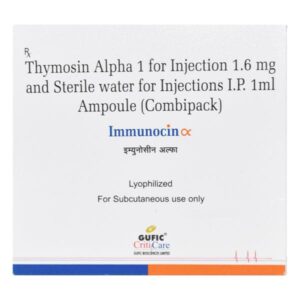THYMOSIN ALPHA
THYMOSIN ALPHA: Thymosin Alpha is a synthetic version of a naturally occurring hormone called thymosin. It is primarily used as an immune system booster and for the treatment of various medical conditions related to immune dysfunction.
The exact mechanism of action of Thymosin Alpha is not fully understood. It is believed to work by stimulating the production and maturation of T-cells, which are important for the functioning of the immune system. Thymosin Alpha also enhances the activity of other immune cells, such as B-cells and natural killer cells, and promotes the production of cytokines, which are involved in immune response regulation.
Thymosin Alpha is usually administered via subcutaneous or intramuscular injection. The recommended dose may vary depending on the specific condition being treated, but a typical dose can range from 1.6 mg to 16 mg per week. It is important to follow the instructions provided by the prescribing healthcare professional.
Thymosin Alpha is generally well-tolerated, but like any medication, it may cause side effects in some individuals. Common side effects may include local injection site reactions, such as pain, redness, or swelling. Less commonly, gastrointestinal symptoms such as nausea, vomiting, or diarrhea may occur. Rarely, allergic reactions or hypersensitivity reactions may manifest as itching, rash, or difficulty breathing. If any unusual or severe side effects occur, it is important to seek medical attention promptly.
It is worth noting that Thymosin Alpha is not approved for use in all countries and may only be available for certain medical conditions or under specific circumstances. It should only be used under the guidance and prescription of a qualified healthcare professional.
Please note that this information is for educational purposes only and should not replace the advice of a healthcare professional.

